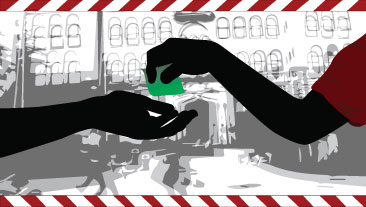Sept. 24 2014
Royal Purple Editorial Staff Opinion
Students caught dealing drugs have a choice when it comes to the consequences. They can accept the charges against them or go down a different route that wipes their crimes to a clean slate: become informants.
In simpler terms, arrested individuals have the chance to buy drugs from other students to help the police make further arrests.
This method has been used for approximately two years on UW-Whitewater’s campus. As effective as it may be when it comes to drug arrests, there are several issues to be considered amongst the police’s tactics.
There’s a choice in the matter, of course. A convicted student can either deal with the punishment (whether that be a jail sentence or not) or perform a “community service”-esque task of helping the police crackdown on other people like them.
When given that option though, is the choice really there?
Becoming an informant is encouraged. It gets rid of the sentence — gives that student another chance — but that’s the trick of it.
No student has the time or desire to serve their sentence behind bars or get tossed out of UW schools.
Presented with those two options (the informant one being sugarcoated), there really isn’t much room to make a decision.
Felon or informant.
Expensive fines or work undercover for the police.
The option is practically tossed at a student as more of a biased suggestion.
So, when a convicted drug dealer accepts the role of an informant, what does that mean for them?
In one word, danger. An informant is sent in for a controlled buy with a recording device and a wristwatch containing a camera.
There are plenty of precautions made but that doesn’t mean the student is entirely safe throughout the transaction.
Sales can go wrong. The dealer could discover the informant’s true intentions, possibly get violent even if records say they haven’t been violent in the past.
Should UW-W students really be put into the sort of danger only trained police deal with regularly?
It’s the job of the police to keep this community clean and safe, not the job of the students. Students shouldn’t feel pressured to dive into potentially life-threatening situations no matter the reason.
To several convicted dealers, settling with the charges is a much better option than putting themselves in a dangerous place. The “choice” of becoming an informant isn’t much of a decision anymore when that’s considered.
Facing the consequences like an adult is preferred over the risk of injury.
Another sticky situation students can get themselves into is the possibility of betraying their friends when they agree to go undercover.
While it’s insensitive to assume drug dealers are only friends with other drug dealers, there is still bound to be a connection.
A student who decides to travel on the path of an informant could very easily run into the problem of having to turn a friend in.
And something about “tattling” doesn’t sit too well in friendships. Trust will become an issue.
These complications with safety and relationships (which are important at this point in a student’s life) can easily be avoided. Police should do their job. Students should deal with the consequences of illegal activities like the adults they are.
Informants may be helping with the increase of drug arrests, but only so much time can pass before something goes wrong.
The only way to avoid that is to bring this practice to a stop.


